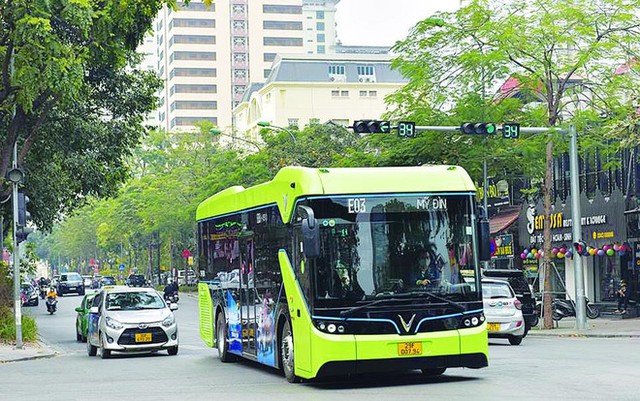Ha Noi fulfills 2026 green transport goal ahead of schedule
VGP - Ha Noi has surpassed its 2026 green transport target, with 20.7 percent of the city’s bus fleet now running on clean energy — a milestone originally set for next year. The rate is expected to climb to 26.5 percent by the end of 2025, according to a review meeting held on November 7 and chaired by Vice Chairman of the Ha Noi People’s Committee Nguyen Manh Quyen.

Dao Viet Long, Deputy Director of the municipal Department of Construction, reported that Ha Noi currently operates 393 green-fuel buses, accounting for 20.7 percent of the total. The city has thus reached its goal one year ahead of schedule. In addition, 60.8 percent of taxis and 40.2 percent of app-based vehicles have switched to clean energy. Ha Noi aims for all buses and taxis to run on electricity or clean fuel by 2030.
To serve the growing fleet, local communes and wards have proposed 52 locations for charging stations, including 39 integrated into existing parking areas by the Ha Noi Parking Company. The Department of Construction and other agencies are finalizing support policies for businesses and individuals transitioning to green vehicles.
At the meeting, Vice Chairman Quyen commended the progress and urged agencies to maintain momentum toward the 2030 goal. He emphasized that charging infrastructure must be developed ahead of demand, meet national standards, and avoid monopolies that could discourage users and investors. The city will soon prepare investment projects for the 52 proposed sites.
He also praised transport companies for leading the transition and called for stronger policy support to encourage residents to adopt electric or clean-fuel vehicles, in line with the Prime Minister's directive on environmental protection issued on July 12, 2025.
Breakthrough mechanisms needed for greener public transport
Ha Noi plans to fully electrify or convert its bus fleet to clean fuel by 2030. However, limited financial incentives have slowed progress, making it difficult for operators to access investment capital.
According to Pham Dinh Tien, Head of the Operations Planning Division at the Ha Noi Public Transport Management Center, electric bus routes have shown strong performance, with peak-hour occupancy exceeding 100 percent and passenger satisfaction above 90percent.
Nguyen Thanh Nam, General Director of Ha Noi Transport Corporation (Transerco), said the company deployed 63 electric buses on four routes in the first half of 2025, completing its 2026 plan ahead of schedule. The results, he said, demonstrate the shared determination of the city and businesses to build a modern, eco-friendly transport network.
However, cumbersome procedures and unclear loan conditions have limited participation by other operators. Deputy Director Long noted that in the past five years, only one company—Bao Yen—has accessed subsidized loans, supporting 139 CNG buses.
To address these challenges, the Ha Noi People's Council, at its session on September 29, 2025, increased the loan subsidy from 50 percent to 70 percent for up to 10 years to encourage investment in vehicles and charging infrastructure.
Director of the Department of Construction Nguyen Phi Thuong pointed out that electric buses cost two to three times more than diesel ones, underscoring the need for stronger financial support.
Vice Chairman Quyen reaffirmed that developing green public transport is a cornerstone of Ha Noi's sustainable development strategy. The city, he said, is refining incentive mechanisms, attracting private investment, and accelerating the rollout of charging and refueling infrastructure.
He added that Ha Noi's goal is to build a comprehensive green transport ecosystem—where government, businesses, and citizens work together to cut emissions, improve air quality, and shape a modern, sustainable capital./.

